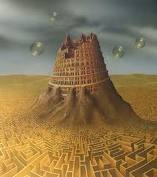 It would be impossible to cover here the range of ideas in Harvey’s recent book, Rebel Cities, but it is worth considering one of its key themes: how might the city, rather than the workplace, be the key site of anti-capitalist struggle?
It would be impossible to cover here the range of ideas in Harvey’s recent book, Rebel Cities, but it is worth considering one of its key themes: how might the city, rather than the workplace, be the key site of anti-capitalist struggle?The Urban Proletariat
In prioritising the site of production and the industrial proletariat as the revolutionary class, traditional Marxism created a number of problems. To begin with, it excluded all those who did not, or could not work from possessing any kind of agency – with the result that the struggles of domestic labourers (women), the unemployed, the disabled were largely ignored. It also left us blind to other forms of value creation outside of the sphere of ‘work’, or indeed forms of exploitation centred not around production but consumption....For Harvey, it is the city which offers a way out – since everyone who lives in the city creates the city but only a minority take ownership of the value that is created.
Read the rest of We Built This City by Jonathan Moses, originally published at Open Democracy |
 . See also, David Harvey essay, "The Right to the City" in New Left Review.
. See also, David Harvey essay, "The Right to the City" in New Left Review.

